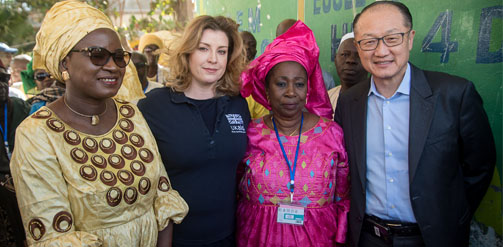The UK Secretary of State for International Development, Penny Mordaunt has set out her vision for UK Aid and Development at the Wellcome Collection. And indeed, there was much to welcome, as well as to cause pause for thought. Here are seven quick reflections on what she said.

1. 3D development
The Secretary of State referred to the trinity of ‘defence, development and diplomacy’, building on previous speeches where she has highlighted the importance of cooperation between DFID, FCO and MOD. The emphasis on defence was notable in this particular speech with numerous references to the ‘shield’ of UK aid protecting against migration, disease and terrorism arising out of poverty, and the use of the ‘stick’ in response to potential threats to the UK and our values. Given the current tensions playing out on the global stage, this is perhaps unsurprising.
2. GREAT Britain and British values
In reaction to Brexit and the negative press and political debate around aid spending there was much talk of the British values that underpin aid and development and the offer that Great Britain has to make to the rest of the world. The Secretary of State called for a renewed and more confident espousal of these values and the offer of Great Britain to the rest of the world. Yet it would have been good to also hear more on how the UK Government plans to work with, and learn from other countries to deliver on its own ambitious aid vision and in meeting the global goals. While she made brief reference to the rising working powers, how does the UK Government including DFID plan to work with these countries? Take China for example. It’s One Belt, One Road Initiative will dwarf global aid spending. It has established a new agency for International Development, and its global influence is extending and shifting the dynamics of current world orders. Are their opportunities for greater collaboration and mutual learning between the UK and China on different policy areas and how can this work in practice? This could be working together to tackle challenges in developing countries, for example trade and investment in poverty reduction in Africa, or learning from each other to strengthen national policy in the UK and China.
3. Health systems
There was a strong focus on strengthening health systems from the Secretary of State. It will be good to see more detail on this, perhaps in the form of the long awaited publication of the health systems framework/policy paper from DFID. With the UK hosting the Global Symposium on Health Systems Research in September and celebrating the 70th anniversary of the NHS and 40th Anniversary of the Alma Ata declaration, the timing has never been better.
4. The good (and the bad and the ugly of tech)
The Secretary of State made much of working with tech companies to deliver on aid ambitions. DFID, along with other donors such as USAID and SIDA, already fund work on the role of tech, for example the Making All Voices Count programme, which looked at how technology can improve citizen voice and strengthen government accountability. Rapidly advancing technologies offer up a whole host of exciting opportunities, yet as findings from the MAVC programme and the frontier technologies for development report testify, tech is no panacea. For starters, 50 per cent of the world’s population still don’t have access to the internet. Plus tech alone cannot build relationships and trust, a raft of more traditional, analogue approaches and techniques need to accompany it. And investments in tech and innovation, need to be underpinned by an understanding of the contexts in which they are to be applied. As the new Chief Executive and Executive Chair Designate of the Economic and Social Research Council (ESRC) Jennifer Rubins said recently “Why spend billions on a new antibiotic without also seeking to understand and improve how GPs prescribe and patients use it?” And although tech can open up spaces and lines of communication, it can also repress, manipulate and obscure. You only have to look at recent news headlines and the congressional hearing with Facebook.
5. A mention for climate change
It was good to hear mention of climate change, albeit brief, which often drops off the agenda in these big set pieces. It was surprising not to hear more about efforts to tackle plastics, which have risen up the political and public agendas in recent months, and when development cooperation can play a crucial role in tackling plastics pollution globally.
6. Dogma in development
The Secretary of State cautioned against ‘dogma’ in relation to reluctance amongst some working in development to partnership with the private sector in meeting development ambitions, saying its role was critical. At IDS we would argue that focusing on the evidence is essential. Evidence on the positive role of the private sector in development is mixed, and significant gaps in knowledge remain.
7. The people’s priorities
Te Secretary of State made of much of the ‘people’s priorities’ informing UK aid and development, and for people the assumption is read British public. Yet what about the priorities of the people UK aid is targeted at helping? Through initiatives such as Participate and MyWorld in the run up to the creation of the SDGs, DFID funded work that sought to include the voices of those too often marginalised and excluded from the very policy-making processes designed to help them. This will be essential to making progress towards the global goals and ensuring no-one is left behind.
Photo credit: Jim Yong Kim and Penny Mordaunt visit a primary school in Dakar, World Bank Photo Collection / Flickr / (CC BY-NC-ND 2.0)
